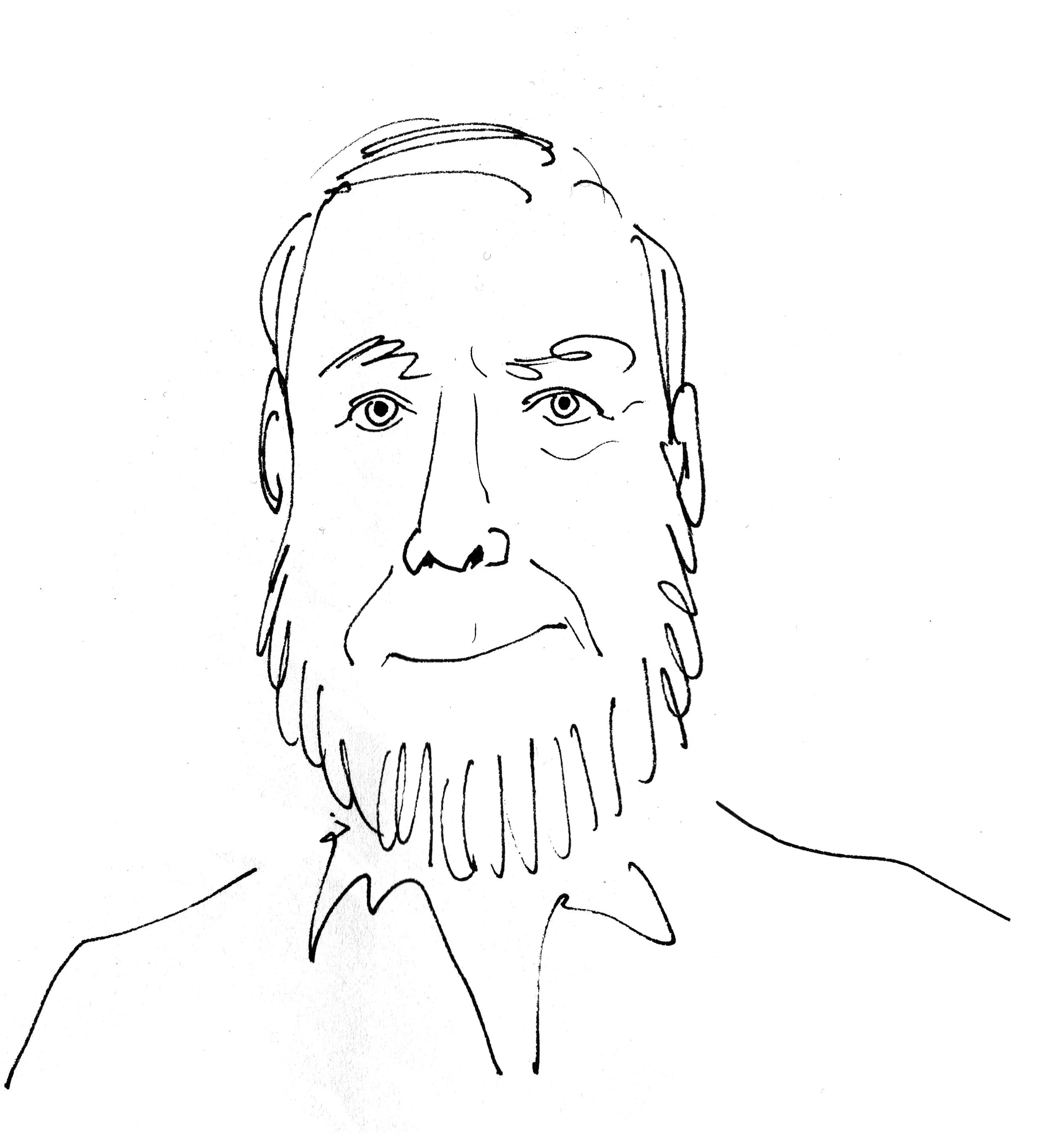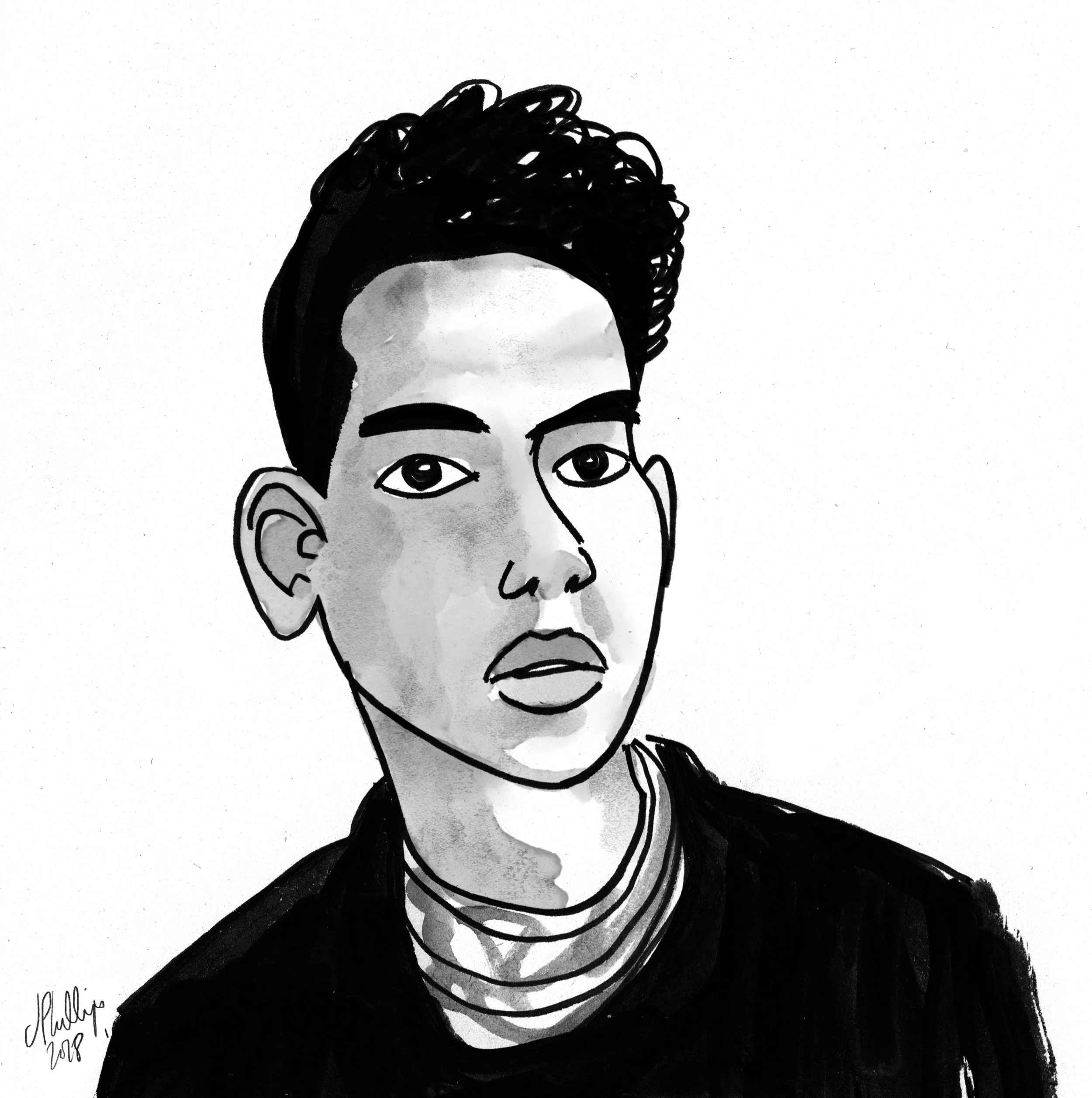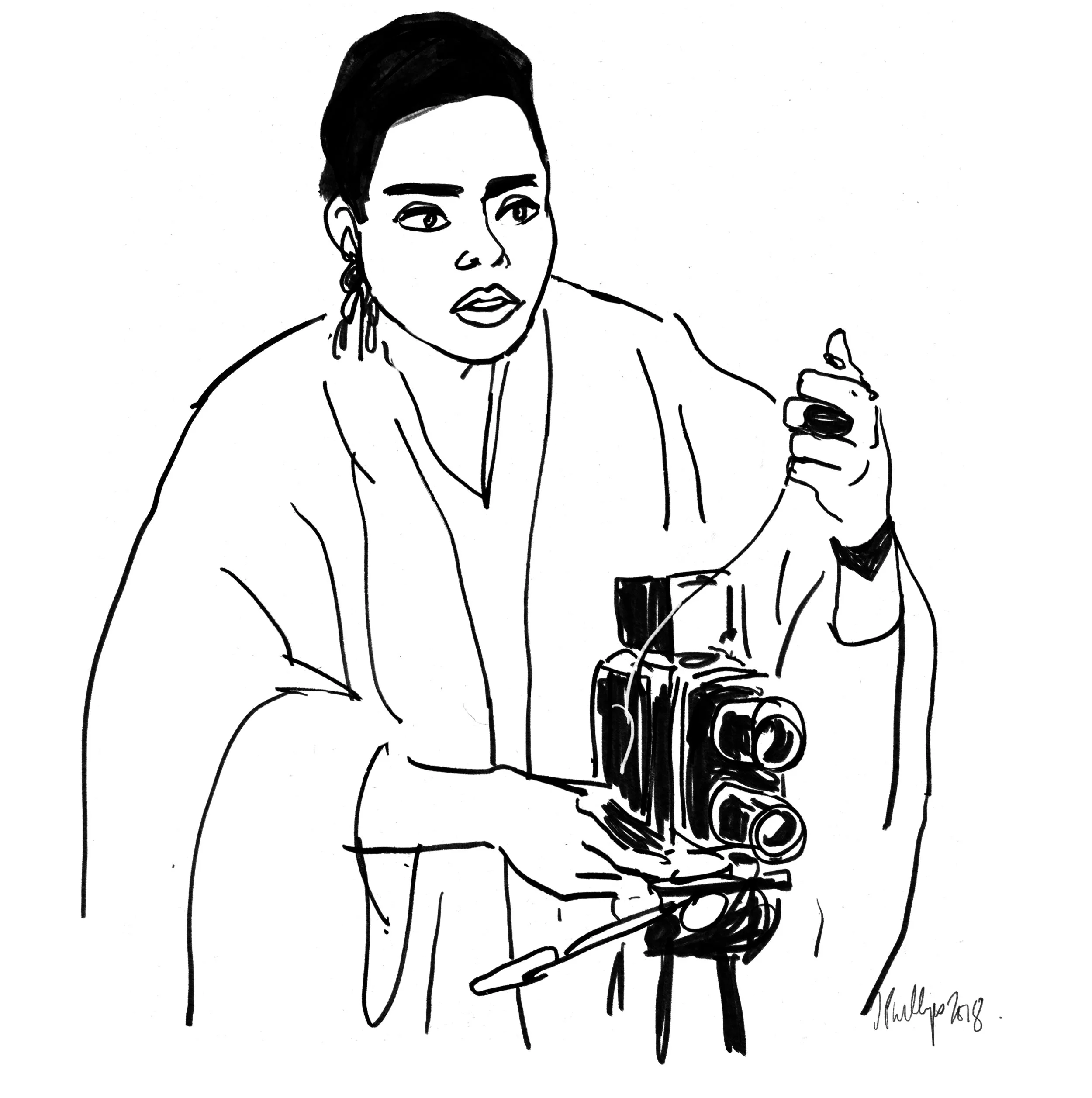Jonas Åkerlund, Director
Jonas Åkerlund is an internationally recognized Grammy and Emmy award-winning director of music videos, commercials, documentaries, concert films, stage shows, and feature films.
He has directed music videos for the likes of Madonna, Lady Gaga, U2, The Rolling Stones, Beyoncé, Pink, Jennifer Lopez, Metallica, Paul McCartney, Ozzy Osbourne, and many more. Most recently he directed action-thriller “Polar,” a Netflix Original Movie starring Mads Mikkelsen.
Jonas shares four photo books that inspire his work, why he believes editing is the best job, and how he brings his ideas to life.
A Child is Born,
by Lennart Nilsson
“If you don't know what it is you will recognize it when you see the pictures because this guy was incredible with technology. He took pictures of inside the body like no one else in 1965.
Now before you even understood technology, you looked at the pictures and thought it was okay. But then you start to think, how the hell did he take these pictures? How did he light it? Where is the camera? That's when it became real impressive. It's incredible what he did up to his death. He was still working at one of the big hospitals in Sweden, taking incredible pictures and did research with a team using his camera. That's something the world should know more about.”
Landet Utom Sig,
by Lars Tunbjörk
“With this book, it’s one of my absolute favorites. It really inspired me to do a type of films that I didn't do before. I sought those pictures. I started to do some really colorful stuff and some really graphic stuff and the camera didn't move much. It really inspired me to add a sense of humor to my stuff that I didn't have before. And of course again, being Swedish, his pictures are as Swedish as you get it. It's so funny to see them. I don't know how well it translates to non Swedish people when you look at it, but for us it's like there's so much tradition and it's so much realness in them.”
Sex: Madonna,
by Steven Meisel
“This is literally one of those moments that we’re all gonna remember forever. It's like the moon landing. In Sweden, I lined up outside a bookstore for hours to buy this book, and I bought two. It's the first time I understood the notion of controversial. And of course I was lucky enough to work with Madonna later.”
Guess Who,
by Peggy Sirota
“I was always inspired with Peggy’s work. It felt like somebody just happened to be there with the camera—maybe that's how they did it. Some of them are more like setups, but it's still so surreal. And that inspired me as a director when it came to directing talent in front of the camera. It's like, “How can I get it to feel like this is just happening in this moment? How can I make it feel real?” Peggy's book also has a lot of sense of humor, great characters, and it's a great portrait book. I've collected portrait books all my life.”
Jonas, who inspired you to get into film?
Jean-Baptiste Mandino—when you google him you're going to get to all the fashion stuff. He's done a ton of fashion, but if you go a little deeper, you'll see that he has done some incredible film work. He's one of the reasons why I started, why I fell in love with commercials. He was one of my idols. I looked up guys like Madino because they knew fashion, photography, and knew how to make it feel real while being creative and having a sense of humor.
What was your first interaction with controversy in making music videos?
I had done a few things before that in Sweden, which was censored and talked about in the press. I talked so much over the years about the controversial thing, and I'm still a little shocked actually. I'm in the back seat laughing about it because it's silly and it's funny how these controversial things pass quickly. One year everybody's like, “Oh, we can't show this video. It's so dark, it's so crazy, it's over the top and blah blah blah.” And then literally like six months later they're showing it. You go back in history and you think about Elvis moving his hips, the Ed Sullivan show, etc.
Well, it's fake. It passes; these controversial things expires fast. I'm looking at Steven Meisel’s book on Madonna just because of this. I was Googling around a little bit, looking at the pictures that Madonna did and I can't really see anything. What's wrong with it? There's nothing bad about it. It's just beautiful pictures.
There’s much worse on Instagram now.
Yeah. And Miley Cyrus’ work was controversial back then, now there’s ass in your face in hip hop videos. I feel like an old guy when I say that. I think it was sexier and better before. Everything's changing so fast. I don't know if it's for the better, that's to be unsaid.
I like as an artist that you can express yourself a little bit more freely, and that's what happened to me when MTV died and Youtube started. I exploded again because I didn't have to think about the censorship and all the stuff that they took out.
And that's where some of those Rammstein videos came from then?
Well, Rammstein is different because that's part of their art to do what they do. For them, it's not pushing the envelope; to them, it's normal. For me to work with them, it's also reminding myself on what it's really about and to think freely. You can do stuff with Rammstein that you can't do with anybody else. Can you imagine if I did a one of those videos with the Cold Play on YouTube?
You've also shot many memorable album covers. Did you have a specific process for these shoots? How do you approach your subject for a shoot like that? Because it seems quite different from a normal portrait or other shoots.
I hate to be technical about it. When I shoot film, I have a setup that has worked for me for many years. It's easy for me because I have people that know exactly how to get it done. Every time I do film photography, I have to start from scratch. I don't have a team, I don't have any cameras. It’s all from scratch.
I always did love taking pictures, in a way, I wish I did it more, especially considering I've been having all these great opportunities when I've been shooting my films to just bring up the camera and take a few pictures at the same time, which I know a lot of directors do. I missed out a little bit on that.
Creatively, I don't want to piss off any photographers. Actually, it doesn't matter if I do, but it's so much easier to take pictures. It's like night and day. The amount of people that we work with when we do films—the scouting, cost, etc.—which photography allows you to be way more spontaneous. It allows you to change your mind and try something new. It's a big difference from filmmaking.
Taking great pictures still requires a lot of hard work. I always liked that when you're taking pictures, you can just turn around and do another one and experiment. I can imagine if you have the technology in your crew, then it seems to be so much easier to do it.
I always loved photography. I wish I did more. I recently finished this new bound book I took pictures, it just came out recently. It feels so good. I love doing these things. I wish I did more of it.
As a music video director, you're connecting the dots between all these diverse ideas and things that inspire you. Where do you usually start in that process of bringing ideas to life?
It’s so different each time. It's everything from how much time you have and how much information you get from the artists. Sometimes they want to be involved, sometimes they are just like, let me do whatever I want tonight. It's so different each time. The one thing I always try to do is some research so I understand what it is, why, where the artist is, and where the artist is going—tying to figure out what the music is about. There's always the second analysis to everything I do.
It’s not me going like, “Oh, I think this would be great because I think it's cool.” It's never like that. I’m always trying to figure it out. I think it has to do with my commercial work back home because I’ve done so many. I liked the idea of a presenting what I'm doing. I don't like any surprises. I like to be really clear in my presentations, and I don't want any questions when we shoot.
It's a lot of work for me to get these ideas right. And I always pass on videos if I don't feel like I have a good enough idea or if I don't feel like I could add anything. Some artists have great videos already. Some artists know so much and what they want, so they don't need me. I have become a little bit of that guy that you go to if you want something a little different than you usually do, which makes me happy. If you want your average music videos, there's some great people that do that and I feel I've become the guy that takes artists and pulls them a little bit outside their comfort zone to do something within the DNA of the artist, but something a little different.
I like music videos where we see what the artist thinks about. I like music videos when there's no story at all, but it's just like my favorite band performing a song, that works too. It's so much about timing too. Sometimes a simple video is what we need and other times we need to do it big. There was a time, about 8 or 10 years ago, when the videos became really ambitious, when we exploded into YouTube instead of MTV. When we were okay to do long pieces and could break it up with dialogue. Working with Lady Gaga was a life-changing moment because I was almost ready to stop making videos.
Lady Gaga showed up and said, “Fuck MTV, we can do it on YouTube and we can do whatever we want.” My videos with her are like 14 minutes long with dialogue and graphics, stopping the music and then back into it. We did all these tricks and experiments that we couldn’t do elsewhere.
Was it the first one that you did with her?
It was Paparazzi in 2009. That was the one where we're just going to town with dialogue and all these kinds of different things.
She seems to be a great collaborator for people who would like to do things differently.
Yeah. She is also the generation of artists that likes making videos. When I started, artists didn't like music videos. Madonna always liked music videos, but most artists didn't like to be in front of a camera. Obviously, today's generation of artists think about the visual part as much as they think about the music, and that makes it easier for me to do my job. Gaga was an eyeopener for me in many ways. And again, I probably would have stopped making music videos if I didn’t run into her.
Does she know that?
I don't think she knows. We've probably talked about it. It's not just me actually, she inspired the world, other artists, and other directors to use videos for their art. It was right after she came around that everybody started to do these big, epic videos.
Do you have any rituals or habits that have sustained and fueled your creativity throughout your career?
I have this thing and it translates into everything I do. When I was an editor, and back then we were cutting tape to tape—this is how old I am—I took it seriously. I could organize the tapes, mark them, move them around, and I put them in the order of colors and letter. I would clean my desk, go to the bathroom, clean my desk again, organizing the tape as part of the process. And then when I finally sat down and edited the work, it happened so fast. I could organize the work, see my desk and clean it, and pull selects, then I sit down and write it in no time.
I've done two movies the last two years, and it was the same process. The movie I did last year was called Lords of Chaos. I literally was thinking about that script for 10 years. And when I wrote it, the first draft came in a couple of days. It was incredible. I was organizing it in my head and I was thinking about it for such a long time. That's a little bit of how I do it; I think about it, I clean my desk, I organize, uphold the selects, and then I just do it at home.
Well, in editing we say this: There's two types of editors. There's one editor who thinks while they’re editing and there's editors that thinks and then edits. Those are two different ways of doing it.
Is there something in your industry, whether it's motion or stills, that you feel deserves more attention?
I always considered myself an editor. I started as an editor. I think as an editor, and everything I do, is preparing for the editing. I don't know what the hell happened because when I grew up and started, editing was not a rockstar job, but it was a good creative job. And now nobody wants to be an editor. Everybody just wants to be directors.
Editing is the best job in the world. You get to do the fun stuff and you get to be creative and you work together with fantastic people. It's like in sound and music and all those things. I would say editing for sure.
How do you work with editing on the still side of things? How do you see that?
Pretty much the same. I pull and select. I would say for me it's harder to do a story in a magazine with pictures than it is on film. If somebody says you got 12 pages and I have a thousand pictures and put them in order, I know how to do it, but it takes a little time.
It's not as easy for me to get footage—it doesn't matter if it's one hour of footage or 100 hours of footage. I take it in. You taste it in my head; it's like I become almost like Rain Man. It's easy for me to see the order of stuff. It's natural to me.
The pictures are a little harder, because I haven't done it enough as much as I have done with films. It's the same approach. It has to be harmony, it has to be a dramatic curve. It must have ups and downs. It's the same approach.
There seems to be too much stuff out in the world, too much content, film, photos, writing, and not enough context. How have you tapped into the power of context in your work? And what are the some of the challenges in terms of providing context around your work?
It's really hard to make anything exclusive today or to make anything that lasts. Again, I'm going to sound like a bitter old man. It's kind of sad that there's a lot of great creativity that just grounds in the massive flow of everything. I've always been quantity before quality. My career has been about saying yes to stuff, and I've done a lot. I averaged 25 to 30 projects a year. And I've done that since I started and that's been my way of getting to quality because I work really well when I'm busy and when I have a lot to do.
I never ever compromise on the quality in terms of working really hard to make sure that every aspect of what I do is as good as it comes—all the hours we spend on figuring out the ideas and how to do it. I never compromised on the job—whether the job was big, small, cool, uncool, whatever. I always go all in. I feel like on one hand, I'm excited about where we are now. I'm excited that people could be spontaneous and put stuff in front of an audience on any platform.
I'm excited about these platforms that I didn't have back when I started. And I dated before the Internet. I remember when I came to America, I had just done The Prodigy’s “Smack My Bitch Up” and there was some controversy on the news and it was never shown anywhere, but somehow everybody had seen it. And I was like, how the hell did you see it? Where did you see it? If it's not played anywhere and the news doesn’t like it, it's not shown anywhere.
Today, we get direct information now because we can release a video and see if we get 20 thousand hits or if we get a 100 million hits, all in a day or two. I like it. It's interesting, and it's fun and I think it's great for the younger generation to have these platforms. You can show your friends, you could just do it and get it done. Again, with that comes a lot of shit. You have to allow yourself to do a lot of shit, to do some good stuff too.
The thing is I never made shit—I'm just kidding. I was so lucky, because in Sweden, it was an incredible time when I started. We were the last country in the world to get commercial TV. Right around the time when we got the commercial TV, there were no directors, nobody who knew how to do it. Just because I had done some music videos, we got to practice with real clients and real money and budgets. My first five or six years that I worked, I had big commercial clients coming in, putting a product on a table and saying, “Do whatever you want.” Literally. We just exploded. That's one of the reasons why Sweden has so many great commercial directors from that era and photographers for that sake too. It was just booming back then; we could do whatever we want. It was incredible.
Obviously, we started to learn more about it, and then we got better at it. Then we started to look at what was going on outside Sweden, which is very typical Sweden. First, we do it our way and then we start to look at American or England to see how they do it.
You mentioned budgets a few times. That's something that has changed a lot too, whether it's music, video, even commercial budgets, depending on the industry. Is that something that you've seen happen?
Budgets for music videos have always been low. Even when they were high, they were low, because the ambition level and the ideas were always bigger than the budget. And clients also want you to do the advertising, so it's a little different. It's a different ballgame. But with music videos, if we have $50,000, we want to make a $250,000 music videos. If you have a $250,000, we want to make a $500,000 video. It's always like that because music has always been spontaneous. It cuts out the middle man, which is the advertising agency. And sometimes I miss them because they do a lot of the heavy lifting and sometimes they're also in the wave of creativity because there's a lot of political stuff involved.
It's incredible to think what we do in music videos. Usually we have a week to write the idea and a week to shoot it. It's incredible that so many music videos have become memorable and works as well as they've done. And as the director, if you have a couple that people remember, then you should be really lucky. And I am lucky to have a few videos that people remember.





















